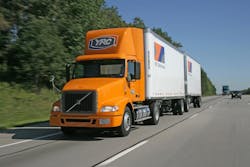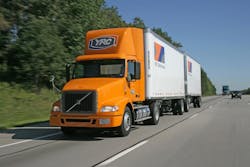Yet some way, somehow, by February a deal ultimately got done between YRC and the Teamsters, allowing the carrier to access fresh capital.
Now, even with this harsher-than-normal winter in the U.S. hitting YRC’s bottom line very hard, it’s managed to keep its losses relatively stable in comparison to the far milder winter of 2012-2013.
For the year, YRC Worldwide reported operating losses of $31.2 million $3.36 billion in revenues, a slight decline from losses of $37.3 million on $3.2 billion in revenue for 2012. So even though revenues declined 2.2%, losses were cut 16.4%. Not what any carrier wants to see – profits of course are king – but that’s a lot better than many expected.
For 2013, YRC Freight also noted that while tonnage per day declined 1.6% to 26,600 lbs. while the number of shipments fell 3.1% to 45.3, revenue per hundredweight only slipped 0.4% to $23.27 while revenue shipment actually increase 1.1% to $273.
For YRC Worldwide as a whole – the parent company for YRC Freight, Menlo Worldwide, etc. – consolidated operating revenue topped $4.865 billion, 0.3% higher than 2012, with consolidated operating income increasing $4.3 million to $28.4 million, with adjusted earnings hitting $257.7 million, a $16.5 million improvement versus 2012.
"Our 2013 operating performance was slightly improved compared to 2012, and though better, we were hampered by execution challenges of the YRC Freight network optimization in the second and third quarters of 2013, driver shortages during the summer months and tough winter weather late in the fourth quarter," noted James Welch, CEO for YRC Worldwide and who also stepped in to be president of YRC freight last year as well.
"While YRC Freight stumbled during 2013, our regional carriers delivered a solid performance with a 5.4% increase in revenue from increases in both tonnage and revenue per hundredweight," he pointed out. "The Regional carriers reported $79.9 million of operating income, an increase of $9.9 million over the same period in 2012. With an operating ratio of 95.4 for 2013, the Regional carriers produced results that were more than competitive within the industry.”Thus it seemed like a good time to bring in a new president to run YRC Freight – Darren Hawkins, 44, (at right) to be precise, a 24-year veteran of the trucking industry with nearly 19 years with YRC broken up by a four-year stint at rival LTL Con-way Inc.
"Darren brings a wealth of knowledge and experience to the position,” noted Welch in a statement. “Having started with Yellow Freight as a dock supervisor and rising through the ranks during his career, he knows this business. The combination of his expertise in both sales and operations will provide invaluable insight and will bring immediate and lasting value.”
Hawkins will be put to the test early and often though as Welch made no bones about the challenges still ahead for YRC Freight.
"As we move into 2014, we will be focusing our efforts and attention on implementing the changes in our recently ratified memorandum of understanding (MOU) with the Teamsters, solidifying YRC Freight's regimented service cycle, more aggressively managing our yield across our operating companies, investing in our technology and revenue equipment and reengaging our workforce," he explained.
“[But now] we have an experienced team, a more competitive union contract, a strong customer base and, for the first time in the last five years, we do not have the overhang of any near-term debt maturities,” he stressed. “Going forward, we will be adhering to a strict set of fundamental freight processes that will allow us to improve our on-time service performance at YRC Freight much like we have at our regional companies. These changes will enable us to provide our customers the best possible service for their specific freight needs.”
Will all of that be enough to finally get YRC out of the woods? This may be the year we finally answer that question.


